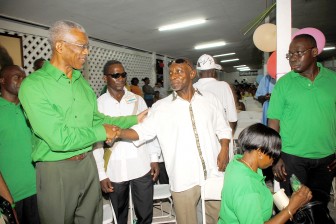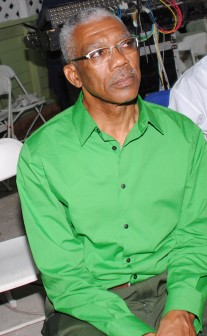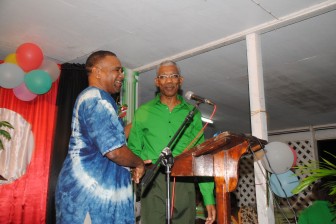Former army chief Brigadier (retired) David Granger was last evening declared the PNCR’s presidential candidate at a Special Congress in a process bereft of the problems which have dogged previous internal party elections.
He secured 279 of the 666 votes cast with former Caricom economist Carl Greenidge amassing 264. Party Vice-Chairman Basil Williams was a distant third with 88 votes while Dr Faith Harding and newcomer attorney James Bond managed 20 and 13 votes respectively. There were two spoilt ballots while the Returning Officer Earl John of Sandra Jones and Associates said another was “somewhat controversial” and was not counted.
However, the night was not without suspense with several recounts which were done at the behest of the Greenidge camp. Chants of Granger erupted from the veteran soldier’s green-shirted supporters at the end when the official tally was given.

In his acceptance speech, Granger said it was a victory for the party and opened with thanks for Party Leader Robert Corbin and his decision not to run for the candidacy, a position which went against tradition locally and in the region.
“He put into operation a process which has transformed not only the party but the country and which will change the constitution of the People’s National Congress Reform,” he said to applause. According to him, the system of primaries employed by the PNCR to arrive at its candidate was a good preparation for anyone aiming to be president and proved that the party was “democratic to the roots.”
“We are a great party and we will win because the process that we put into operation which ended this evening, although it’s only part of the national campaign, has demonstrated the superiority of public opinion over the opinions of a few selected officials; this is democracy and this evening democracy won,” he said to applause.
Granger thanked his local campaign team and was effusive in his gratitude for the support of those in North America who he said energised him and the party. He also expressed thanks to the military veterans adding that even those who were not part of the party had pledged their support to him. Meanwhile, in noting a challenge from Corbin for others to contribute to the party’s election fund and to better his opening contribution of $100,000 Granger said he would be writing a cheque for $100,001.
He closed by calling on the other nominees to be part of the national campaign to change the way the country is governed.
Speaking to reporters afterward, he said his campaign headquarters will now be merged with the party’s to start the national campaign immediately.
“My focus will be the same thing I’ve been saying for the last six months, public security, reform of the education system, reform of the economy to bring an end to joblessness, that’s my main concern,” he said.
However, the likelihood of Greenidge becoming his prime ministerial candidate given his strong showing were not as clear cut as some may have thought.

“I believe in equality of women and I’m looking to women. I’m keeping all my options open but I’m more inclined to have a woman as prime minister,” he said noting that he has not mentioned any name when queried about Dr Harding’s chances at filling the slot.
Meanwhile, the former army chief noted the party’s commitment to pursue a coalition with other parties and groups to contest the elections and an agreement to go with a consensus candidate saying he will abide by that.
“The PNCR is the largest opposition party at present and I anticipate that with the support that has been mobilised behind this presidential campaign that we will continue to be the largest party so I look forward to continuing the talks with the other opposition parties but I think they recognise the strength of the PNCR.”
According to Granger, given the strength of the other opposition parties he believes that the PNCR will have a predominant role to play in government should the coalition succeed at the polls.
Granger said that despite the strengths of his rivals he never feared that he would have lost the candidacy since he believed that his message convinced the people that he would be the best presidential candidate.
Meanwhile, Greenidge in brief remarks to the media said the process had its hiccups which he supposed were normal but that he had “no problem” with it.
“The process itself was as we had agreed; there were numbers based upon votes cast and I don’t have any problem with that.”
Greenidge, a former PNC finance minister who had been employed with Caricom until December said it was too early to say what is next on his political horizon.
Granger, who has put security, at the centre of his platform, is a newcomer to active politics.
He is now ranged against the AFC’s candidate Khemraj Ramjattan and they now await the PPP/C’s conclusion of its process to select their helmsman.
Granger, 65, has emerged out of the most open and transparent process that the PNCR has had in years. He and the four other candidates were introduced to PNCR rank and file in a series of township-style meetings across the length and breadth of the country.
During this period, Granger has faced nagging questions about the role of the army – of which he was a member at the time – in the rigging of elections by the PNCR. One incident in particular related to the deaths of two men who were trying to prevent the seizing of ballot boxes by the army.
Granger has also faced questions about whether his party should apologise for transgressions committed during the period of its rule from 1964 to 1992.
In an interview with Stabroek News in October last year after he announced his interest in the candidacy, Granger said he believes that the PNCR can win an election under the current electoral system.
“Yes we can—it sounds corny—but we can win, yes…I think the PNC can deliver that and I think that is the type of society that people want. And people who want that society, I think, they would want to vote for the PNC,” he added.
He, however, reiterated the PNCR’s commitment to coalitions and cited as examples its association with the Reform component-which has since been formally integrated into the party-and the 1-Guyana movement, with which it contested the last election. Granger added that if he were to win the candidacy, he would be open to approaches by other parties that are interested in making the country a better place to live.

He said the PNCR would continue to be a national party, which appeals to all ethnicities in the country. He pointed out that largely in the past the party has attracted support from the working-class and, with innovations by late former President Desmond Hoyte, the business-class as well. “So, it’s a national party and I believe it can attract national support,” he said. He pointed out that while the majority of votes have come from the Afro-Guyanese group, persons have committed to the party for ideological, geographical and even selfish reasons. “But I’m not sure that purely ethnic parties can survive in Guyana,” he said, noting that such ventures have failed in the past. He said the parties which last are those which are inclusive.
He added that while the architecture for shared governance has not been put in place, it would be a political priority to reach out to other groups to form an administration which shares power. “I would like to see a Cabinet with people who are not necessarily PNC but who can contribute to the objective of making the country a safe place to live in,” he said. “We must get the best Guyanese. We must—I think—abandon the practice of ensuring that every single diplomat must be a sort of party member or every single head of a corporation must be of one ethnicity. We are talking about meritocracy. I think Guyana needs to put people in positions of authority who can perform their jobs and who deserve to be put there.”
Inexperience
Granger described himself as a professional and not a politician but said that he did not see a dividing line between the two fields. “I prefer to work for national goals in the professional field,” he explained.
He added that there must be a start and pointed to Winston Churchill becoming British Prime Minister at the age of 65 and leading it successfully through World War II. He also drew attention to the more recent success of Barack Obama in securing the US presidency despite having very little political experience. “There is no way of gaining presidential experience, except in the presidency,” Granger said. “I do believe that the rigours and the responsibilities of command of the defence force between 1979 and 1990 were such that would prepare me to carry out these governmental functions.” He also emphasised that he would not be alone; rather, he would part of a team that would include specialists in areas such as economics, sociology, health, and public security.”
Errors
The PNCR has been out of office for almost two decades but has had to contend with a legacy that includes charges of dictatorial governance, electoral fraud and human rights abuses. Party members have wrestled with the question of whether the party needs to apologise for past mistakes when considering the question of widening its support base, with some in favour and a majority opposed.
Granger, linked to the PNC administration by virtue of his military service, noted that there were “errors” by both the PPP and the PNC. “I don’t feel the PNC, at present, needs to apologise for anything. What it needs to do is to have the past investigated and where things are proven to be wrong or illegal or as you describe them as excesses, well, let an inquiry speak,” he said. “I don’t know that governments go around apologising for every single error that they made. As far as what you describe as excesses are concerned, I think we must move away from anecdote and if there is evidence that wrong has been done these things could be investigated.”
He noted the ruling that the 1997 election of late former President Janet Jagan was “unlawful” and he questioned who would apologise for it.
He also questioned who would apologise for the assassination of Agriculture Minister Satyadeow Sawh and the massacres at Lusignan, Bartica and Lindo Creek. “So, if we go into the business of apologies, you know, let’s go the whole hog,” he said. “Let us look at the performance of the administrations from 1957 to 1964, 1964 to 1992, [and] 1992 to the present day. But I don’t know if that is going to be helpful. At least on one occasion, Mr (Bharrat) Jagdeo said we need to have a ‘mother of all inquiries.’ Well, let us have a mother of all inquiries. Let us put these ghosts to rest.” He added that the truth cannot be had without an inquiry and argued that there is no point urging an apology on an anecdotal basis. Granger noted historian Clem Seecharan’s writings on late former President Cheddi Jagan and he questioned whether the PPP would have to apologise for its activities at that time.
Militancy
On the question of party militancy, Granger differed with the perception that the PNCR had gone docile, saying it was not “a pussy cat party” when he addressed the first town meeting in Georgetown in January at the St George’s School. “Walking down Regent Street is not the only sign of militancy. I think if you were able to come out into the fields with us, into what is happening in Queenstown, into Corriverton, into Manchester, into Hopetown, you would see a very vibrant party. The party doesn’t only exist in Regent Street, it exists throughout all of these regions and they’re very strong, the people are very alert and people have been very energised even electrified by this process.”
Reform
At a meeting held at the Skeldon High School Annex at Corriverton in January, Granger told the gathering that the first thing he would do is to reform the GPF because it is currently under-equipped and its members underpaid.
Among his other priorities are the stamping out of piracy and the patrolling of the Brazilian border to prevent gunrunning and smuggling of narcotics. He said the Guyana Defence Force must be allowed to do its job of protecting the borders and should not be used “as a big riot squad….”
Granger stated confidently that “for the first time I am going to put a big drug lord into jail, you watch it.”
He noted that a big problem on the Corentyne is public security. He pointed out that “some people regard contraband as a sort of cottage industry but that it is strangling the legitimate economy. The small producers are overwhelmed by illegitimate imports from across the border.”
According to him, the longer we permit “backtracking” and “smuggling we would always end up with problems of piracy and underproduction.”





